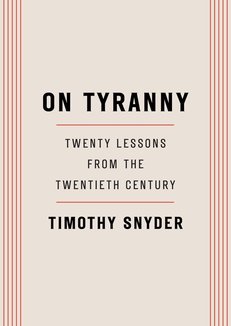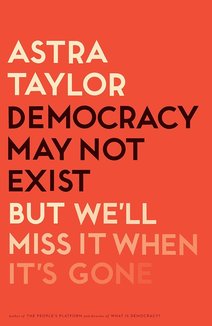Recommended Books

On Tyranny: Twenty Lessons from the Twentieth Century
Author:
Timothy Snyder
ISBN 13:
978-0804190114
#1 NEW YORK TIMES BESTSELLER • A “bracing” ( Vox ) guide for surviving and resisting America’s turn towards authoritarianism, from “a rising public intellectual unafraid to make bold connections between past and present” ( The New York Times ) “Timothy Snyder reasons with unparalleled clarity, throwing the past and future into sharp relief. He has written the rare kind of book that can be read in one sitting but will keep you coming back to help regain your bearings.”—Masha Gessen The Founding Fathers tried to protect us from the threat they knew, the tyranny that overcame ancient democracy. Today, our political order faces new threats, not unlike the totalitarianism of the twentieth century. We are no wiser than the Europeans who saw democracy yield to fascism, Nazism, or communism. Our one advantage is that we might learn from their experience. On Tyranny is a call to arms and a guide to resistance, with invaluable ideas for how we can preserve our freedoms in the uncertain years to come.

Democracy May Not Exist, but We'll Miss It When It's Gone
Author:
Astra Taylor
ISBN 13:
978-1250179845
What is democracy really? What do we mean when we use the term? And can it ever truly exist? Astra Taylor, hailed as a “New Civil Rights Leader” by the Los Angeles Times , provides surprising answers. There is no shortage of democracy, at least in name, and yet it is in crisis everywhere we look. From a cabal of plutocrats in the White House to gerrymandering and dark-money compaign contributions, it is clear that the principle of government by and for the people is not living up to its promise. The problems lie deeper than any one election cycle. As Astra Taylor demonstrates, real democracy―fully inclusive and completely egalitarian―has in fact never existed. In a tone that is both philosophical and anecdotal, weaving together history, theory, the stories of individuals, and interviews with such leading thinkers as Cornel West and Wendy Brown, Taylor invites us to reexamine the term. Is democracy a means or an end, a process or a set of desired outcomes? What if those outcomes, whatever they may be―peace, prosperity, equality, liberty, an engaged citizenry―can be achieved by non-democratic means? In what areas of life should democratic principles apply? If democracy means rule by the people, what does it mean to rule and who counts as the people? Democracy's inherent paradoxes often go unnamed and unrecognized. Exploring such questions, Democracy May Not Exist offers a better understanding of what is possible, what we want, why democracy is so hard to realize, and why it is worth striving for.